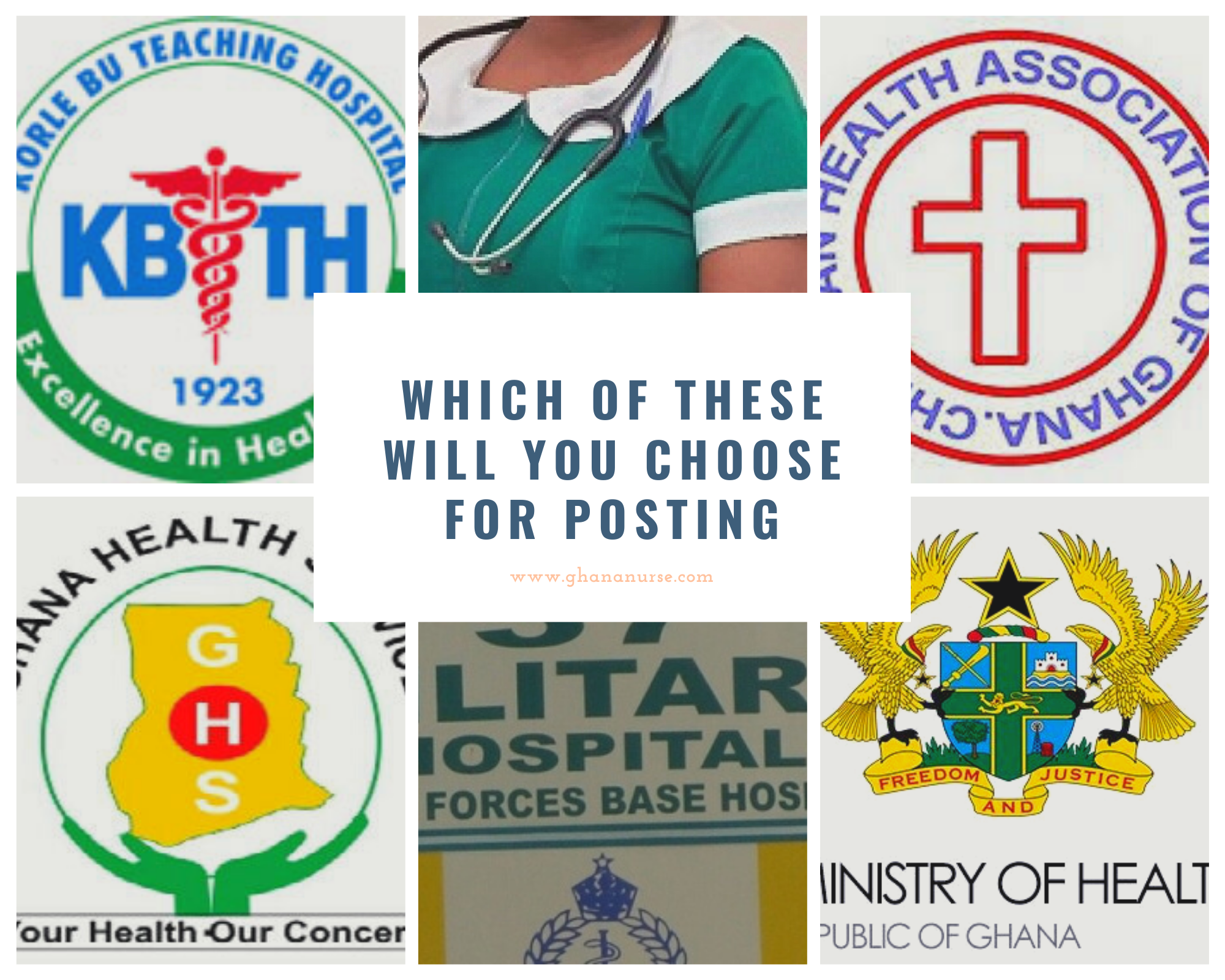Where To Go For Nursing Posting: CHAG, TEACHING HOSPITAL, GHANA HEALTH SERVICE, PRIVATE SECTOR OR QUASI-GOVERNMENT HOSPITAL
Nurses in Ghana spend up to 4years in training and after successfully passing their licensure exams, they undergo mandatory one-year internship in a hospital (rotation), before they are issued a license to practice in Ghana.
After receiving a pass to practice, the newly licensed nurse would have to decide on the sector to kick-start his/her career. In Ghana, there are a lot of sectors one can decide to work as a nurse. We have hospitals directly manned by the government through the Ghana Health Service (GHS), Christian Health Association of Ghana (CHAG) hospitals, the Teaching Hospitals, Quasi-Government Hospitals, and the Private Sector. In this article, I will throw light on these sectors and the opportunities they present.
Ghana Health Service Hospital
The government is the largest employer of the health workforce in Ghana and through the Ghana Health Service, it employs most of the health workers licensed to practice in Ghana. Ghana Health Service hospitals/clinics/health centers are across the country; found in every district and town. Most people choose to work in GHS hospitals because of low employee turnover rate; compared to other sectors. And because of its spread across the country, you can easily change post (move from one GHS hospital to another location). There is a fix structure where employees can rise through the ranks with less hassle and opportunities for management and clerical duties/positions also come with ease.
However, because of the focus on primary health care delivery, most health facilities are involved in less complicated medical/surgical procedures. Due to this, there is a general notion that one may ‘rust’ when he/she assume a post at Ghana Health Service. However, this notion does not apply to their regional hospitals and selected district hospitals involved in specialist medical/surgical services. Also, due to their spread, there is a high chance of being assigned to a health facility in a town with limited social amenities.
Christian Health Association of Ghana Hospitals
CHAG is a network organization of health facilities owned by different Christian Church Denominations. CHAG provides health care to the most vulnerable and underprivileged population groups in all 16 Regions of Ghana, particularly in the most remote areas. Recruitment is usually done by the government. Though it has low employee turnover rate, due to its decentralized management system, staff must work harder to please their bosses especially for promotion. CHAG is like Ghana Health Service (both in pros and cons) except that staff may get extra benefit or remuneration for working in a CHAG facility. Some CHAG facilities periodically sponsor their staff for higher learning either in or outside the country.
Teaching Hospitals (often referred to as Ministry of Health Hospitals)
Teaching hospitals serve the Ghanaian community with specialist medical and surgical services. There are few teaching hospitals across the country with Korle Bu being the first teaching hospital in Ghana. Though operatively they are independent of Ghana Health Service (the main health agency for policy implementation for Government), the Ministry of Health supervises their work. Just like GHS, recruitment is done by the government. Teaching hospitals are always in the cities thus issues of limited social amenities are ruled out. Staff of teaching hospitals are on a similar pay and rank structure as staff of GHS. However, internal policies (which is different for each teaching hospital) may help you to get additional benefit/remuneration from internally generated funds.
Also, because teaching/training of health care professionals are one of the core mandate of teaching hospitals, there is opportunity for periodic professional developments. Nurses who assume post at teaching hospitals are also exposed to management of challenging medical and surgical conditions and also, the use of sophisticated medical equipment.
However, as compared to GHS, there is limited managerial and clerical positions available thus nurses must usually rise to the peak of their career before assuming such roles.
Quasi-Government Hospitals
The Quasi-Government Health institutions comprise government institutions, agencies and departments that have their main service focus not being on health but engage in health services activities. Police hospitals, Military hospitals and Ghana Atomic Energy hospital are all examples of quasi-government hospitals. Though their employees are on the government pay roll, most of these institutions manage their own recruitments. Health employees of these institutions may enjoy conditions of service and salary structure, better than their counterparts in other government agencies.
Like Teaching Hospitals, there is limited managerial and clerical positions available, thus nurses must usually rise to the peak of their career before assuming such roles. Also, structure for promotion may differ from that of Ghana Health Service and may be specific to the institution that owns the hospital.
Private Hospitals
Most health professionals take employment in the private sector whiles waiting for the government to recruit them. Until recently, the private sector used to be less lucrative. There is high employee turnover in the private sector which discourages many individuals from taking long term (permanent) employment in the sector. The salary structure of nurses in the private sector varies from low (below GHS salary) to high (above GHS salary) depending on the size and location.
However, with the emergent of large private hospitals in Ghana (at times networked), some health professionals now take long term employment in the sector. Though there is limited managerial or clerical roles available, the few professionals who take up long term (permanent) employment in the private sector can assume such roles at the early stage of their career.
Some private hospitals focus on specialist medical or surgical services thus professionals who take up roles in the sector are exposed to challenging conditions and at times the use of sophisticated medical equipment which may not be available in the government sector. Also, they usually have flexible working hours which affords the opportunity for part-time or locum employment.
I hope this article has given you an idea of how employment in the Ghanaian health sector looks like. Leave your comments and questions in the comments box below.





8 Comments
Thanks for the clarification….
Please does the selection of an organisation for posting applies to only nurses (and midwives) or those under Allied Health also….
And please incase I chose to work with the CHAG and later decided to work under GHS, would it be possible and easy to switch to the other sector?
Thank you.
Selection of organization for posting is a personal decision to make. However, it is largely affected by availability too. As a young professional, you have to first take advantage of any avenue available to work or practice. However, when it happens that you have more than one of these available, then you take a decision according to your career goals.
I am not real great with English but I get hold this real easy to understand. Hilda Maxie Clementius
I know this web site presents quality dependent articles and other stuff,
is there any other web site which provides these kinds
of things in quality?
Thanks for finally talking about > Where To Go For Nursing Posting:
CHAG, TEACHING HOSPITAL, GHANA HEALTH SERVICE,
PRIVATE SECTOR OR QUASI-GOVERNMENT HOSPITAL –
Ghana Nurse < Loved it!
Wow, this paragraph is nice, my younger sister is analyzing such things,
thus I am going to tell her.
Thank you very much for the information
Good write up. Love it